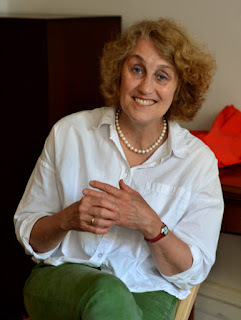Melissa Knox is the author of the new memoir Divorcing Mom: A Memoir of Psychoanalysis. Her other work includes books about Oscar Wilde and scholarly articles on writers of the 19th century. She teaches American literature and culture at the University of Duisberg-Essen in Germany.
Q: Why did you decide to write this memoir?
A: In a confused, sad moment, I came across old journals I'd
been writing since I was 14 or 15. I'd naively recorded, word for word, things
my analyst said to me--without, at the time, any judgement about what he'd
said.
Around the same time I was still struggling with his notions
of how I should behave toward my mother, what I should feel about her--his
instructions very much opposing my own inclinations. I discovered the website Daughters
of Narcissistic Mothers--a revelation.
These two discoveries, the old journals and the website,
made the scales fall from my eyes. The journals let me see my desperate
adolescent self, longing for guidance and unable to perceive, not daring to
see, that I wasn't getting it. The website pointed out what my analyst had
trained me not to see: that my mother would never, could never, consider any
point of view other than her own. And that she desperately needed a mother, and
faulted me for not being hers.
Q: What impact did psychotherapy have on you and on your
family?
A: Disastrous. But it was literally responsible for my
existence. The psychoanalyst who was treating--separately--the persons who
became my mother and father introduced these two ill-matched people to each
other. I believe the analyst did so because, after her divorce, she was sad and
lonely and fell for my father. Guilty about these feelings, she palmed him off
on my mother, then blamed my mother for not loving him.
I may be giving the analyst too much credit, however: she
certainly manipulated these two into marriage, possibly because my mother had
enough money to support my father, and the analyst had figured out that my
father would never make much of a living. The analyst kept the two of them
together for a quarter century, during which they tormented each other and paid
her for her "help."
Q: What do your family members think of the book?
A: My mother and cousins known nothing about it as far as I
know--I'd like to let sleeping dogs lie. Nothing I write will make them feel
differently and I see no reason to disturb them. I can imagine reactions
ranging from wholesale denial to "How dare you tell?"
Q: What do you hope readers take away from the memoir?
A: That trusting one's own judgement--not going along with
an authority whom you trust only because he or she is older--is best. I hope
there's a form of analysis out there that involves self-discovery, rather than
the rigid indoctrination I experienced. I'd like readers to tackle taboo
topics, like permanently separating yourself from your mother, physically or
emotionally or both. And I'd like readers to know that the worst returns, if
not to laughter, at least to a sense of the absurd.
Q: What are you working on now?
A: I've been writing nonfiction on a range of topics--being
a cancer patient, teaching literature in Germany, sexuality in menopause--a
number of personal essays. I've completed one draft of a novel and am letting
that sit while I start another. The novel writing has been a wonderful escape
from me, a lot of fun.
Q: Anything else we should know?
A: I love hearing from readers. A question I get frequently is "Don't you love your mother?" The answer is that unfortunately I do--it's excruciating. I think I love her more, or have more understanding and therefore sympathy, now that I've researched and written the things that happened to her and to me in psychoanalysis. Keeping my distance allows me to feel more sympathy.
--Interview with Deborah Kalb


No comments:
Post a Comment